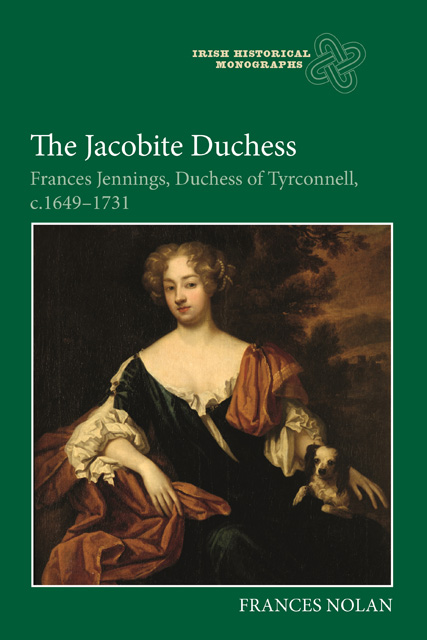Book contents
- Frontmatter
- Dedication
- Contents
- List of illustrations
- Acknowledgements
- List of abbreviations
- Notes on the text
- Introduction
- 1 ‘The malicious little gipsy’: Early life, c.1649–65
- 2 ‘Hambleton is now going into France’: Marriage, motherhood and migration, 1666–76
- 3 ‘Ruined beyond redemption’?: Widowhood, remarriage and returning, 1676–86
- 4 ‘That caballing humour’: A political woman, 1687–90
- 5 ‘Every one’s eye is watching’: Treason, forfeiture and exile, 1691–99
- 6 ‘Always a plane dealor’: Changing fortunes and life in the Low Countries, 1700–08
- 7 ‘A duchess-nun’?: Family, faith and finance in old age, 1708–30
- 8 ‘Albion’s fairest plant’: Death and legacy, 1731
- Appendix A: Duchess of Tyrconnell’s family tree
- Appendix B: Books in the possession of the duchess of Tyrconnell in Dublin, transported from her apartment in the Château de Saint-Germain-en-Laye
- Appendix C: David Nairne’s ‘Cyffer w[i]th the D[uche]sse of Tyrconnel, 5th August 1702’
- Bibliography
- Index
- Irish Historical Monographs previous volumes
6 - ‘Always a plane dealor’: Changing fortunes and life in the Low Countries, 1700–08
Published online by Cambridge University Press: 04 January 2024
- Frontmatter
- Dedication
- Contents
- List of illustrations
- Acknowledgements
- List of abbreviations
- Notes on the text
- Introduction
- 1 ‘The malicious little gipsy’: Early life, c.1649–65
- 2 ‘Hambleton is now going into France’: Marriage, motherhood and migration, 1666–76
- 3 ‘Ruined beyond redemption’?: Widowhood, remarriage and returning, 1676–86
- 4 ‘That caballing humour’: A political woman, 1687–90
- 5 ‘Every one’s eye is watching’: Treason, forfeiture and exile, 1691–99
- 6 ‘Always a plane dealor’: Changing fortunes and life in the Low Countries, 1700–08
- 7 ‘A duchess-nun’?: Family, faith and finance in old age, 1708–30
- 8 ‘Albion’s fairest plant’: Death and legacy, 1731
- Appendix A: Duchess of Tyrconnell’s family tree
- Appendix B: Books in the possession of the duchess of Tyrconnell in Dublin, transported from her apartment in the Château de Saint-Germain-en-Laye
- Appendix C: David Nairne’s ‘Cyffer w[i]th the D[uche]sse of Tyrconnel, 5th August 1702’
- Bibliography
- Index
- Irish Historical Monographs previous volumes
Summary
The passage of the act of resumption in 1700 did not create a clear path back to Ireland for the duchess of Tyrconnell and it would be a full two years before she set foot in Dublin. Much occurred in the intervening period, not least the death of the rival kings, James II and William III. James succumbed first, in September 1701 and William died from pneumonia six months later, in March 1702; a complication from a broken collarbone following a fall from his horse. It was the death of another king, however, that would determine the course of European politics for the next fourteen years, rupturing the peace that had been effected by the Treaty of Ryswick in 1697 and drawing the great powers back into conflict. The War of the Spanish Succession erupted in Europe in 1701, following the death of the childless Charles II of Spain. Diplomatic solutions had been sought in anticipation of Charles’ death, as both Louis XIV and the Emperor Leopold I of Austria had married the Spanish king’s sisters, Maria Teresa and Margaret Teresa, and each could claim the throne for their descendants.
In 1698, France, England and the Dutch Republic signed The Treaty of The Hague, agreeing that the grandson of Leopold I, Joseph Ferdinand of Bavaria, would inherit Spain. The Bavarian prince died of smallpox in 1699, however, and the French, English and Dutch delegations went back to the drawing board, signing the Treaty of London in 1700, which recognised the claim of Leopold’s younger son, Archduke Charles. Having amended his will in favour of Joseph Ferdinand and then Archduke Charles, the ailing Spanish king came under pressure from pro-French courtiers, led by Cardinal Fernández Portocarerro. Charles II experienced a deathbed change of heart and altered his will to appoint Louis XIV’s grandson, Philippe, duc d’Anjou, as his successor. Louis might have been willing to honour the Treaty of London if he could have relied on the English and Dutch to back him in a territorial dispute with the Holy Roman Emperor, but he found that his co-signatories were not prepared to go to war on his behalf.
- Type
- Chapter
- Information
- The Jacobite DuchessFrances Jennings, Duchess of Tyrconnell, c.1649-1731, pp. 142 - 167Publisher: Boydell & BrewerPrint publication year: 2021



